When You Marry Someone You Marry Their Family
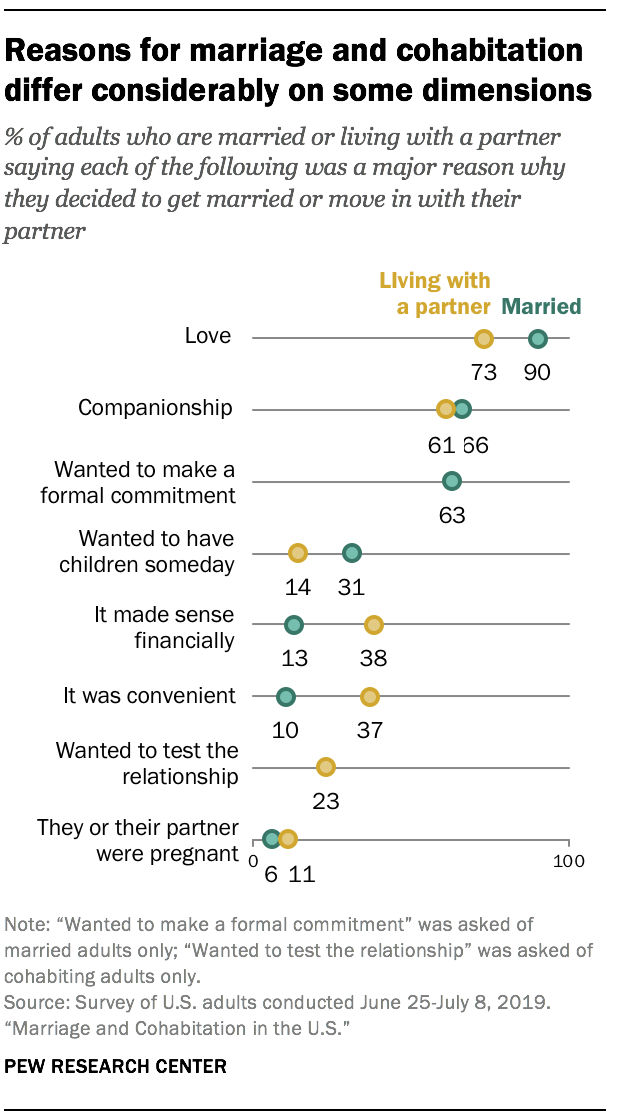 The decision to get married or to motion in with a partner is a personal one, just for well-nigh married and cohabiting adults, love and companionship trump other considerations, such as the desire to have children someday, convenience or finances. For a majority of those who are married – peculiarly if they didn't live with their spouse before marriage –wanting to make a formal commitment is besides a major cistron in their decision to marry.
The decision to get married or to motion in with a partner is a personal one, just for well-nigh married and cohabiting adults, love and companionship trump other considerations, such as the desire to have children someday, convenience or finances. For a majority of those who are married – peculiarly if they didn't live with their spouse before marriage –wanting to make a formal commitment is besides a major cistron in their decision to marry.
Among married adults who lived with their spouse before getting married and who were non engaged when they moved in together, most two-thirds say they idea of living together as a step toward spousal relationship; 44% of adults who are currently living with a partner and were not engaged when they get-go started doing so say they thought of it that mode when they moved in together.
Virtually 4-in-x cohabiters who are not engaged say they want to get married someday, and 58% in this group say they are very likely to ally their electric current partner. When asked why they are not currently engaged or married to their partner, many cite fiscal reasons.
Nearly four-in-ten cohabiting adults cite finances and convenience every bit major reasons why they moved in with their partner
Among married and cohabiting adults, love is cited more any other reason for why they decided to get married or to move in with their partner: xc% of those who are married and 73% of those living with a partner say dearest was a major factor in their conclusion. Majorities in both groups besides cite companionship as a major reason why they decided to become married (66%) or to move in with their partner (61%), and 63% of those who are married say they wanted to make a formal delivery.
Making a formal commitment is seen every bit a more important factor by married adults who did non live with their spouse before marriage. Seven-in-ten in this group say making a formal commitment was a major reason why they decided to get married, compared with 57% of married adults who had already been living together.
More than practical reasons come up into play to a greater degree for cohabiting adults than for those who are married. About four-in-ten cohabiting adults say moving in with their partner made sense financially (38% say this was a major reason why they decided to motion in together) or that it was user-friendly (37%). Far smaller shares of married adults say these were major factors in their decision to get married (13% and x%, respectively).
In turn, married adults are about twice as likely equally those living with a partner to say that the fact that they wanted to accept children someday was a major reason why they decided to get married: 31% of those who are married say this, compared with fourteen% of cohabiters who cite wanting to accept children as a major reason why they decided to movement in with their partner.
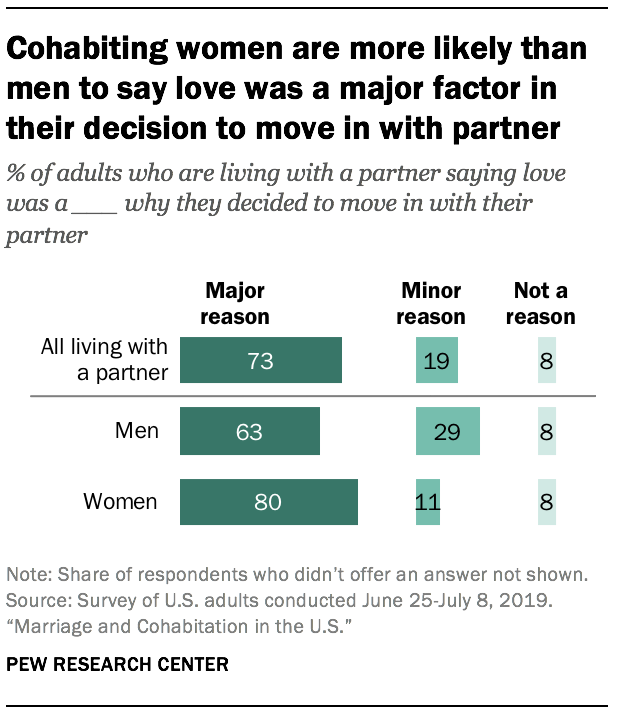 Among cohabiters, women are more likely than men to say love and wanting to have children someday were major reasons why they moved in with their partner. Eight-in-10 cohabiting women cite love as a major factor, compared with 63% of cohabiting men. And while 17% of women say wanting children in the future was a major factor in their decision to move in with their partner, 11% of men say the same. In that location are no notable gender differences among married adults.
Among cohabiters, women are more likely than men to say love and wanting to have children someday were major reasons why they moved in with their partner. Eight-in-10 cohabiting women cite love as a major factor, compared with 63% of cohabiting men. And while 17% of women say wanting children in the future was a major factor in their decision to move in with their partner, 11% of men say the same. In that location are no notable gender differences among married adults.
There are also some differences across educational groups among married and cohabiting adults. Virtually half of cohabiters with a bachelor'south degree or more education say finances (48%) or convenience (50%) were major factors in their decision to move in with their partner, compared with almost a third of those with less instruction (36% cite finances and 33% cite convenience equally major reasons). Almost one-in-ten cohabiters with some higher or less pedagogy (xiii%) say a major reason for moving in together was that they or their partner were pregnant; only 4% of those with a bachelor's degree or more education say the same. Among married adults, those with a bachelor's degree or more education are more likely than those with less education to cite companionship (74% vs. 62%), wanting to make a formal commitment (70% vs. 58%) and wanting to take children someday (39% vs. 27%) as major reasons why they decided to go married.
For the almost part, reasons for moving in together don't vary considerably betwixt cohabiters who are either engaged or in an otherwise very serious relationship and those who do not describe their relationship every bit very serious. Merely those who are engaged to their partner (78%) or who are not engaged but describe their relationship as very serious (83%) are far more than likely than those who are in a less serious relationship (44%) to say honey was a major factor in their decision to live with their partner. Cohabiters who are engaged (21%) or in a very serious relationship (15%) are too more likely than those who are not engaged and do non describe their relationship as very serious (7%) to say wanting to take children anytime was an of import part of their decision to move in with their partner.
Overall, nearly a quarter of those who are living with a partner say they are engaged to be married (27%), while half are non engaged just describe their relationship as very serious; 23% of cohabiters are non engaged and practice non describe their relationship as very serious.
Many run across living with a partner equally a footstep toward spousal relationship
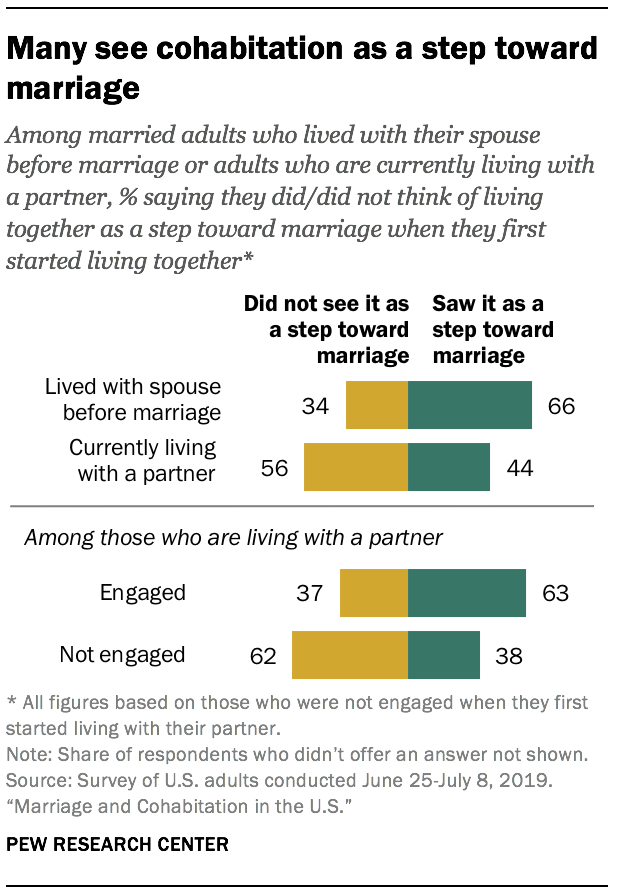 Among married adults who lived with their spouse before they were married and who were not yet engaged when they moved in together, 66% say they saw cohabitation as a pace toward spousal relationship when they outset started living with their now-spouse. Almost four-in-ten cohabiters who were not engaged when they moved in with their partner (44%) say they thought of information technology this way when they started living with their partner, but the share rises to 63% when looking only at those who take since gotten engaged. A bulk of married adults who lived with their spouse before marriage (73%) or who are currently engaged (84%) say they were non engaged when they beginning moved in with their partner.
Among married adults who lived with their spouse before they were married and who were not yet engaged when they moved in together, 66% say they saw cohabitation as a pace toward spousal relationship when they outset started living with their now-spouse. Almost four-in-ten cohabiters who were not engaged when they moved in with their partner (44%) say they thought of information technology this way when they started living with their partner, but the share rises to 63% when looking only at those who take since gotten engaged. A bulk of married adults who lived with their spouse before marriage (73%) or who are currently engaged (84%) say they were non engaged when they beginning moved in with their partner.
Amongst cohabiters who are non currently engaged, half of those with a bachelor's degree or more education (50%) and 43% of those with some college say they saw cohabitation every bit a footstep toward marriage when they starting time started living with their partner; smaller shares of those with a high schoolhouse diploma or less education (28%) say the same.
About a quarter of not-engaged cohabiters don't want to get married
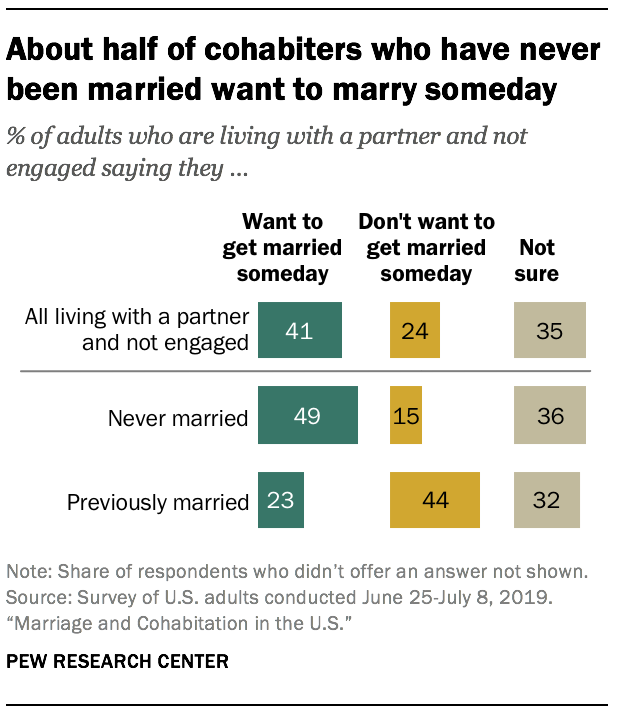 About iv-in-ten adults who are living with a partner and are not currently engaged (41%) say they want to get married someday, while 24% say they exercise not desire to get married and 35% are not sure. Cohabiters who take never been married (49%) are more than probable than those who are divorced or widowed (23%) to say they want to get married in the future.
About iv-in-ten adults who are living with a partner and are not currently engaged (41%) say they want to get married someday, while 24% say they exercise not desire to get married and 35% are not sure. Cohabiters who take never been married (49%) are more than probable than those who are divorced or widowed (23%) to say they want to get married in the future.
Nigh vi-in-ten cohabiters who are not engaged and say they would like to become married in the future (58%) say they are very likely to marry their current partner; 27% say this is somewhat probable, while 14% say it is not too or not at all likely that they will marry their partner. About one-in-five in this group (18%) say they and their partner often talk about getting married, while 48% say they talk about this sometimes and 34% say they and their partner rarely or never talk virtually getting married.
Many not-engaged cohabiters who want to become married someday cite finances every bit a reason why they're not engaged or married
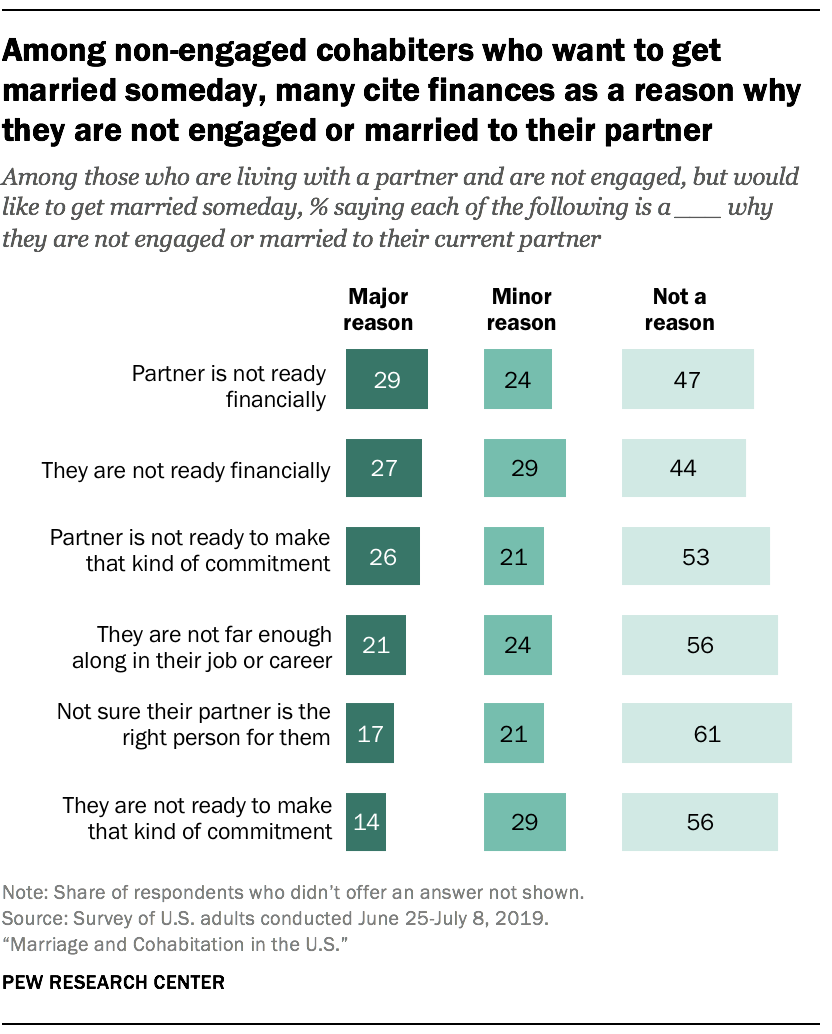 Two-thirds of cohabiting adults who are not engaged but say they would like to become married someday cite either their partner or themselves not being ready financially equally a major or minor reason why they are not engaged or married to their current partner. Nearly three-in-ten (29%) say their partner not beingness set up financially is a major reason and another 24% say this is a minor reason why they are not engaged or married. Similarly, 27% say their own lack of financial readiness is a major reason, while 29% say it is a minor reason.
Two-thirds of cohabiting adults who are not engaged but say they would like to become married someday cite either their partner or themselves not being ready financially equally a major or minor reason why they are not engaged or married to their current partner. Nearly three-in-ten (29%) say their partner not beingness set up financially is a major reason and another 24% say this is a minor reason why they are not engaged or married. Similarly, 27% say their own lack of financial readiness is a major reason, while 29% say it is a minor reason.
Among adults who are living with a partner and are non engaged but want to get married anytime, 21% say the fact that they are not far plenty forth in their job or career is a major reason why they are not engaged or married to their current partner; another 24% say this is a minor reason.
These cohabiters are more likely to cite their partner (26%) than themselves (14%) non being ready to make that kind of commitment every bit a major reason why they are not engaged or married; 29% cite their ain lack of readiness in this regard as a modest reason (21% say the same about their partner's lack of readiness), while about half say each of these is not a reason.
The survey also posed this question to cohabiters who are not engaged and are non certain they want to become married someday. For the about part, this group is less likely than those who do want to marry to cite the above reasons as explanations for why they're not currently engaged or married to their current partner. There are two exceptions, however. Cohabiters who aren't certain if they want to marry are more than likely to say not being personally ready to brand that kind of commitment and not being sure their partner is the right person for them are reasons why they are not engaged or married to their current partner.
In general, cohabiters don't feel much pressure to get married
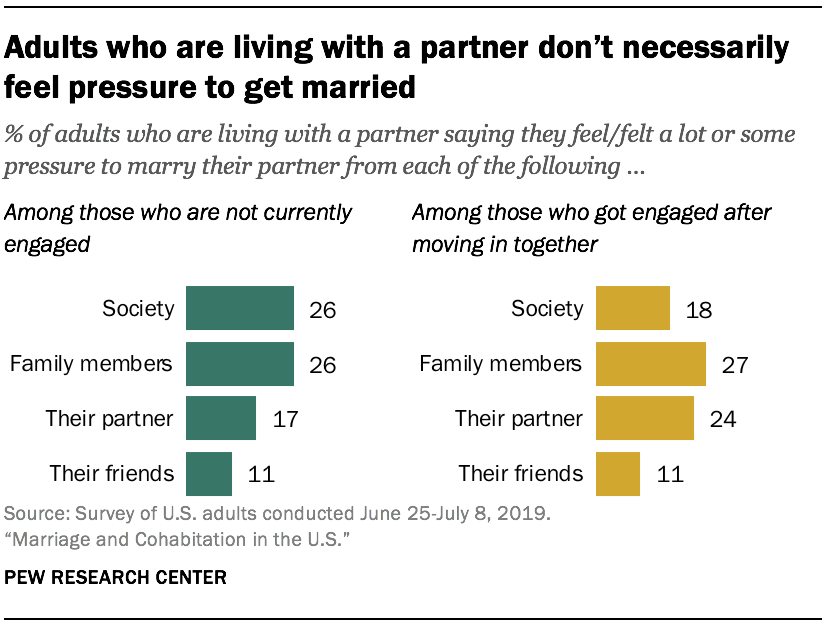 Relatively modest shares of cohabiters who are not engaged say they feel force per unit area to marry their partner: about a quarter say they feel at least some pressure from family members (26%) or from gild (26%), while even smaller shares say they feel pressure from their partner (17%) or from their friends (xi%). Similar shares of engaged cohabiters who got engaged after moving in with their partner say they felt pressure to get married later they moved in together.
Relatively modest shares of cohabiters who are not engaged say they feel force per unit area to marry their partner: about a quarter say they feel at least some pressure from family members (26%) or from gild (26%), while even smaller shares say they feel pressure from their partner (17%) or from their friends (xi%). Similar shares of engaged cohabiters who got engaged after moving in with their partner say they felt pressure to get married later they moved in together.
Amongst non-engaged cohabiters in opposite-sexual activity relationships, men (24%) are more than likely than women (12%) to say they feel at least some pressure level from their partner to become married.
Americans meet delivery as a prerequisite to both marriage and cohabitation
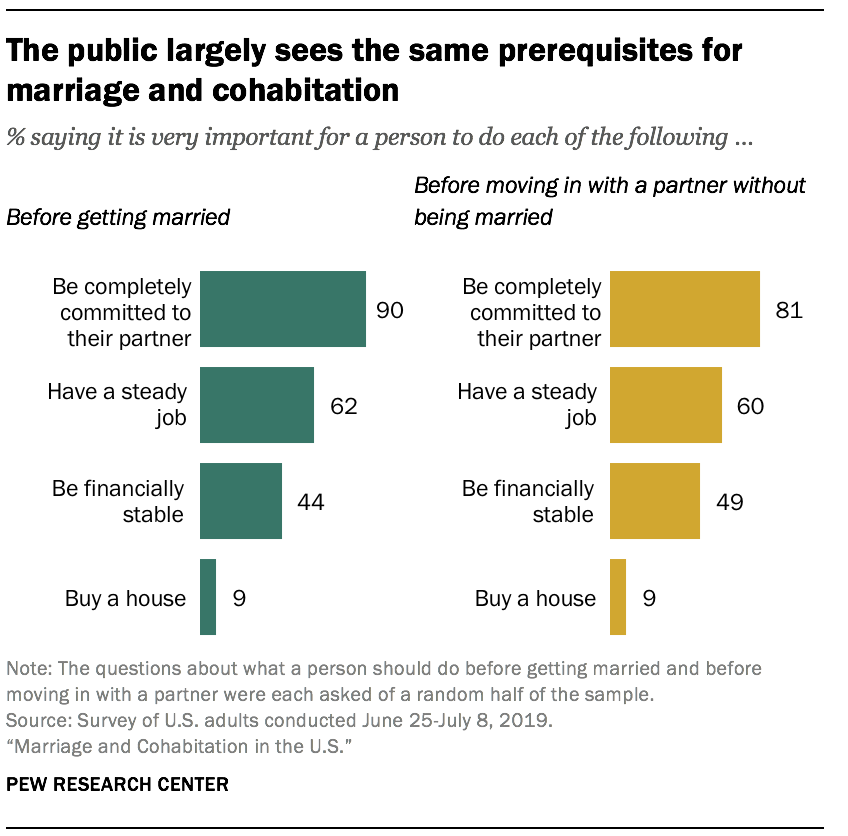 Most U.S. adults say information technology is very important for a person to exist completely committed to their partner before getting married (90%) or moving in with a partner without being married (81%).ten Nigh half dozen-in-ten call up information technology'due south very of import for a person to have a steady job before getting married (62%) or moving in with a partner (60%), and nine% say information technology'southward very important for a person to buy a house before doing each of those things. Near half (49%) say being financially stable is very of import before moving in with a partner; 44% say this is very important for a person to do earlier getting married.
Most U.S. adults say information technology is very important for a person to exist completely committed to their partner before getting married (90%) or moving in with a partner without being married (81%).ten Nigh half dozen-in-ten call up information technology'due south very of import for a person to have a steady job before getting married (62%) or moving in with a partner (60%), and nine% say information technology'southward very important for a person to buy a house before doing each of those things. Near half (49%) say being financially stable is very of import before moving in with a partner; 44% say this is very important for a person to do earlier getting married.
For the well-nigh part, women are more probable than men to say each of these is very important for a person to do earlier getting married or moving in with a partner. For example, about two-thirds of women say it'south very important for a person to have a steady job before getting married (67% vs. 58% of men) or moving in with a partner (66% vs. 54%). And while about half of women say it'south very of import for a person to be financially stable before getting married (48%) or moving in with a partner (53%), smaller shares of men say the same (forty% say this is very of import before marriage and 44% say it is very important earlier moving in with a partner).
Adults with some college or less didactics are more than likely than those with at to the lowest degree a bachelor's degree to say information technology's very important for a person to take a steady chore (68% vs. 50%) or to be financially stable (47% vs. 38%) before getting married. Those without a college degree are also more likely than college graduates to say having a steady job is very of import before moving in with a partner (64% vs. 52%), but like shares across educational attainment – about half in each group – say being financially stable is very important prior to cohabitation.
Cohabiting adults are more likely than those who are married to see existence financially stable as a prerequisite for marriage: Near half of those living with a partner (49%) say this is very important for a person to do before getting married, compared with 39% of married adults. Cohabiting adults are also more likely to say buying a business firm is very important before getting married, although pocket-sized shares of cohabiters (12%) and those who are married (8%) say this. And while large majorities of both groups say it's very important to be completely committed to their partner, married adults (92%) are more likely than those who are cohabiting (81%) to say this.
When it comes to possible prerequisites for cohabitation, there are no significant differences between married and cohabiting adults when information technology comes to the importance of being completely committed to one'due south partner, having a steady job, buying a house or being financially stable before moving in with a partner.
Source: https://www.pewresearch.org/social-trends/2019/11/06/why-people-get-married-or-move-in-with-a-partner/
0 Response to "When You Marry Someone You Marry Their Family"
Post a Comment